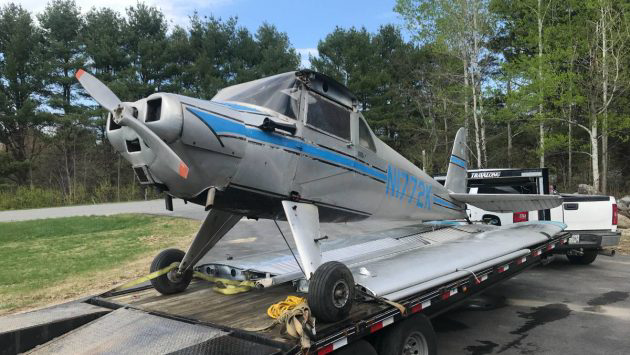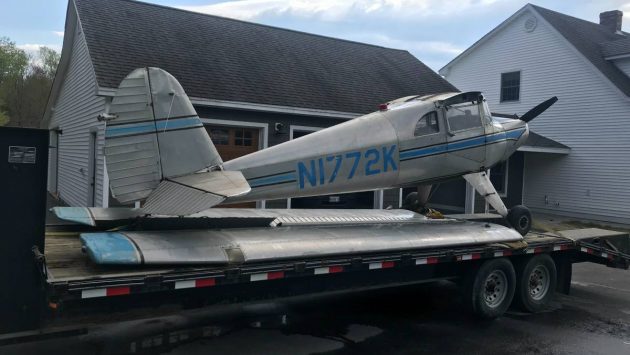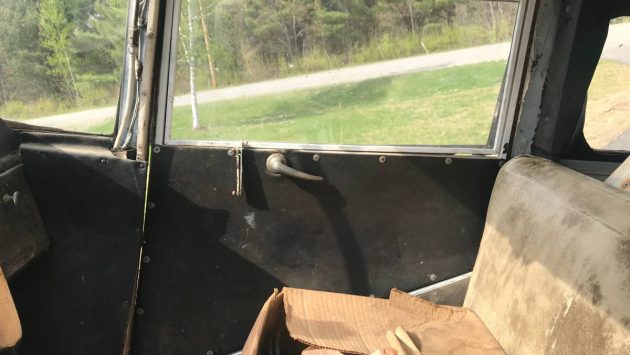Logs Since New: 1947 Luscombe 8E
Oftentimes, the planes that show up on craigslist are worth talking about. This 1947 Luscombe 8E is no different, and it’s located in Maine after having not known flown since 1977. It’s an interesting alternative to a Cessna of the same era, and in their day, Luscombes were fairly advanced aircraft. Find it here on craigslist for $4,750 and go here if the ad is archived.
One of the major design achievements of Luscombe aircraft was the all-metal monocoque wing arrangement, replacing the industry standard of a fabric covering. This provided a cheaper and less complex design, and later changes to the vertical and horizontal stabilizers likewise simplified construction and sped production times up.
An 8E like this one would feature the new cockpit design which relocated fuel tanks from the fuselage to the wings. This freed up some space within the cabin to create a small shelf for storage for the occupants. The 8E also featured a more powerful engine over the prior years with 85 b.h.p. on board. The seller notes this example comes with all logs since new.
Taking on an airplane project can be daunting, but there are many aviation enthusiasts that will tell you planes of this era are so blissfully simple that there’s nothing to be afraid of. I like the idea of a vintage aircraft as part of any collection of classic automobiles, but don’t have the space; if you do, would you consider having this Luscombe 8E in your stable?
Auctions Ending Soon
 2002 Subaru Impreza WRXBid Now2 days$333
2002 Subaru Impreza WRXBid Now2 days$333
 1975 Chevrolet Corvette ConvertibleBid Now2 days$4,000
1975 Chevrolet Corvette ConvertibleBid Now2 days$4,000
 1964 Ford F-100 Camper CustomBid Now2 days$2,000
1964 Ford F-100 Camper CustomBid Now2 days$2,000
 2006 Jeep Wrangler SportBid Now4 days$10,500
2006 Jeep Wrangler SportBid Now4 days$10,500
 1974 Datsun 260ZBid Now6 days$460
1974 Datsun 260ZBid Now6 days$460





Comments
Well, I guess I asked for it (planes, battleships,etc. on BF’s)Nothing to be afraid of? Hello, you’re 1,000 feet off the ground.( minimum altitude, I think) I like the “quick disconnect” wings. Bring the tail up, and drive it around, as is.
I got frustrated with how long my restoration was taking on N77885 and did exactly that one calm afternoon.
Tall narrow gear and no ailerons.
Dumbest thing I ever did in aviation, but I got away with it.
Finally finished and flew it nearly 2000 hours including three coast to coast trips without a mishap due to a patient and thorough 10 hour check out.
Hey Dave,
Are you still the owner of the N77885? If so I have a few questions for you, and if not……I still have a few questions for you!
Thanks,
Kandi
The most daunting thing about a luscombe is the ground handling…….they are more prone to ground loops than nearly anything else of there time. I watched as one attempted a crosswind landing, it got on the ground ok but before getting off the runway, a wing picked up and it flipped sideways. The gear is also narrow. One of my airplanes is a Stinson 108-2 that is superior in every way except it is fabric and requires a hanger for storage. Another common problem with small 2 place aircraft of this vintage is weight capacity…..2 modern size people can’t fly it with full fuel without being over weight. If I was small and wanted a 2 place taildragger, I would prefer a Taylorcraft. Otherwise these are great Art Deco pieces of art that look super hanging in your hanger’s rafters……where most can be found.
Any relation to Orville?
Hey guys, take a look at yo’tube about a bad Luscombe landing out on the left coast. They landed sideway with a drift and it did not ground loop. Would’a killed me.
The 8A wasn’t that much more prone to the ground lomcevak than a Cessna 120/140 series. The Stinson shouldn’t even be considered a taildragger… it’s that forgiving. One of my favorites. Then there’s the Gull Wing Stinson. Another favorite.
There’s a bunch of birds around here that were in a lot worse shape than this one when their restoration was started. All flying now.
All true, and the Gullwing is incredible but the Howard is better with it’s more common Pratt and Whitney R985.
Just remember, Dave, you can fly a Wright farther than you can ship a Pratt.
Easy fix….bolt a leg to each wing tip and put harbor freight casters on them…..Snap! No more white knuckles.
Remember, Dave, there are two kinds of pilots who fly taildraggers: those who have ground-looped and those are GOING to. Actually, I thought that a Piper Pacer was notorious for ground loops. I knew a guy who converted his Tri-Pacer into a Pacer (don’t ask me why). He struggled with the landing roll every time…
Hope you brought that extra pair of underwear with you.( by watching several “ground loop” videos, it seems they are coming in too fast)
https://www.youtube.com/watch?v=HkDQBXH02fE
The biggest problem with tail-draggers is landing in a crosswind. Many of the older ones have a free-castering tail-wheel so when you lose your rudder control the crosswind takes over and can put you out of control very fast. Sometimes a tail-‘SKID’ like the real early planes used was better. No one has been able to explain it to me but a nose-gear naturally wants to move straight forward. But a tail-dragger wants to switch ends and put the tail first.
Same aircraft.I
I have been flying tail draggers since 1954.
I have owned two Luscombes aircraft,Cessnas, pipers,Bellanca and never ground looped one of them.
I read all the accident reports in Flying mags and others.
My answer is learn to fly the airplane or leave it in the hanger. The Howard is not an easy aircraft nor is the Gull Wing Stinson.
I have flown the J-3 Cub, the Citabria and the Pitts Special and have never ground-looped.
I love it, I remember these, however never flew one. It just seems like such a deal ,less then 5K for an airplane, makes you almost think, I could do this, and then reality creeps in and you know it is just the tip of the iceberg of an adventure you probably can’t afford!
The narrow landing gear make for rather unforgiving landings, but these are a hoot to fly. The dammage to the vertical stabilizer likely means this has been on its back, perhaps from one of those unforgiving landings. This will be a monster project but at least it’s possible if the logs are complete as promised. The engine rebuild alone will set you back about $15,000. That radio should be in a museum. Just updating the panel will cost most of what this old bird is worth. Look at this example on trade-a-plane for what 26K will get you. https://www.trade-a-plane.com/search?category_level1=Single+Engine+Piston&make=LUSCOMBE&model=8E&listing_id=2315544&s-type=aircraft
It is sad, but this Luscombe is good for parts or perhaps a static display.
if it had been on its back wouldnt the verticle stabilizer be much worse? Wouldn’t there be more damage to the prop and cabin area?
Granted I know nothing about plane crashes (other than they are bad!) and that’s why I’m asking not telling.
I love seeing planes, and motorcycles or other “oddball” barn finds out of the ordinary realm of old cars. Please post more of them. It’s way more fun than Trade-A-Plane! Thanks for including it!!!
I own both a Lotus Esprit and an Europa and they both have a bigger cockpit than this plane. I have flown in them in the past as one of them belonged to a friend but all the comments about ground handling are true, weight capacity also true, fun to fly TOTALLY but damn it is a small airplane.
Never had a pilot permit, went in silently on half of a share, 4 owners, with my friend who hadroject multi- engine , towards a refurbished ex US military DC 3, and just my 1/8 share towards Federaly regulated and mandated maintenance was not cheap, partner bought my share.
They made money with it, I asked not
how and where, and finding ultralight about as exciting as watching an arthritic aged porcupine cross road gave up on flying,, off the ground anyways.
Interesting pproject if capable, and yes flipped two, but buyer had best have all past ownership and flight records for gov, and especially other lower 48 pilots whose clannishness and nose in air is legendary, will gleefully screw you over.
Was this a successor to the Luscombe Silvaire that I remember as a kid?
Almost unique. Not many of them around, compared to a Cessna 140 or a Piper Super Cub. The journey to restore this would be a busy one, mostly with getting it to comply with the FAA. Looks like a good project, and a lot of fun to fly around afterwards. But it’s going to cost you. I shudder to think of what it’s going to cost to get the radio and instruments back in shape, let alone the engine. Speaking of which, the engine could be a Franklin, same outfit that supplied engines to Tucker….
Continental C-85
I have time in one of these. We flew loops, rolls, and spins. Never ground looped. Tame compared to a Pitts S-1.
This is a simple stick and rudder plane, one of the guys who worked at the repair station I did rebuilt a ground looped one. His had the typical wrinkle in the skin aft of the main gear showing a hard landing or two. My first plane was a Cessna 150 purchased in a like disassembled condition. Knowing the wings that are holding you up at 5000 feet are same ones that were on saw horses in your yard gives you pause to think about the quality of your work.
I’m guessing it’s storm damage. I have seen one plane literally wrapped around another because of high winds. The wing tips look OK, left horizontal stabilizer leading edge is banged in addition to the damaged vertical stabilizer so ground loop is out. Anybody else notice the 1956 date on the airworthiness certificate. Weight and balance data missing?
One of the coolest plane pictures I ever saw was at a small WVA airport. Taken during high wind, it was a picture of a J3 Cub flying about 1 foot off the ground at the ends of its tie down ropes.
One nice thing about these types is some fall under the Light Sport category letting you start flying cheaper then buying a new LSA,which can run 50K on up.
Nope. Continental C-65/75/85. The 108s had the Franklin 6 cyl. Franklin did make a 2 cylinder for the 1970’s Champs. Franklin has a good support group. The EAA chapters are a big asset for restorers as well. No need to do it alone.
Any a/c that qualifies as a LSA makes ownership a lot easier. LSA were SUPPOSSED to cost 50K. Try 150K for a CTLS.
And… you can get an STC for using auto gas for a lot of light a/c. No need to buy avgas ($5.60/gal.) unless you don’t fly regularly.